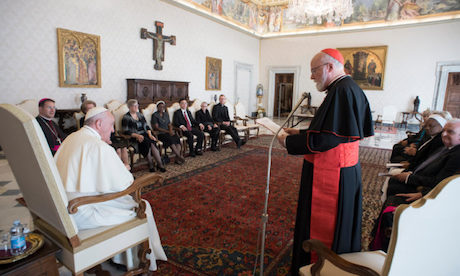Pope Francis has told the Pontifical Commission for the Protection of Minors he has been learning “on the job” better ways to handle priests found guilty of abuse.
He admitted this during his first face-to-face discussion with the Commission on September 21.
The Pope said he has come to regret agreeing to a more lenient sanction against an Italian priest, rather than laicising him as the doctrinal team recommended.
Two years later the priest abused again. The pope said he has since learned “it’s a terrible sickness” that requires a different approach.
Pope Francis endorsed an approach of “zero tolerance” toward any members of the church found guilty of sexually abusing minors or vulnerable adults.
He said he has decided whoever has been proven guilty of abuse has no right to an appeal, and he will never grant a papal pardon.
The experts on the 15-member Commission have made some suggestions to Pope Francis:
- Exempting cases that involve “sexual delicts” and crimes against minors from the norms governing pontifical secret. The application of the principles of pontifical secret during canonical processes may hinder the reporting of suspected child abuse to civil authorities.
- Involve professional lay experts in the preliminary investigation during the canonical process looking into alleged abuse.
- Establish a minimum right to information for victims.
- Amend Vatican to eliminate the statute of limitations on accusations of sexual abuse, which is currently set at 20 years after the alleged victim’s 18th birthday.
- Conduct in-depth research to study paedophilia and its canonical implications for marriage, holy orders and religious profession.
- Study a proposal to declare paedophilia an impediment to receiving the sacraments of holy orders and matrimony.
- Create an international survivor advisory panel actively to inform and help the commission maintain a victim-first approach.
- Adopt the commission’s recommendations for Vatican offices, bishops’ conferences and religious superiors on appropriately responding to correspondence from survivors.
- Continue to endorse a Day of Prayer and Penance for victims and survivors of sexual abuse as part of showing solidarity, acknowledging sins that have occurred and asking for forgiveness and healing.
Source
Additional reading- What the Pope’s new approach to abuse cases will mean
- Pope candidly admits Church 'arrived late' in confronting abuse
- Pope vows to never pardon paedophiles after admitting Catholic Church's failing to tackle abuse
- Pope: "Church will apply firmest measures against those who abuse minors"
- Text of Popes Address to Commission
- Abuse survivor calls for more accountability after Pope Francis promises “zero tolerance”




